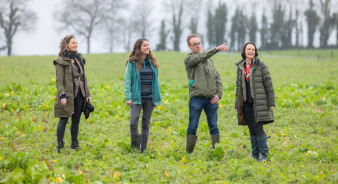


Regenerative agriculture project
Objective
To improve the economic and climatic resilience of malting barley farming in Ireland.
To promote regenerative agricultural practices in barley farming.
To help malting barley farmers transition to more regenerative agricultural practices.
Description
Irish Distillers Limited (IDL), a subsidiary of Pernod Ricard, is deeply committed to biodiversity and regenerative agriculture.
In March 2023, IDL joined with HEINEKEN Ireland for a three-year collaboration which will support malting barley farmers in adopting regenerative agricultural practices on their farms. The pilot project is part of a global collaboration initiated by HEINEKEN and Pernod Ricard to build resilience into the production of agricultural raw materials.
The project will seek to improve soil health and carbon retention, increase biodiversity, improve water quality and improve the livelihoods of farmers through the adoption of a series of regenerative agricultural practices. These include minimising soil disturbance, increasing crop diversity, increasing soil cover by maintaining living roots all year round and reducing chemical inputs. A financial incentive will be provided to famers to support the cost of implementation and in-field experiments.
The project also involves key players in the supply chain, including a selection of 15 participating farmers from across counties Carlow, Kildare, Laois and Wexford and partners Earthworm Foundation (sustainability non-profit) and Boortmalt (malt producer). Learnings from the study, including information on the environmental impact of the measures adopted, will be shared, and leveraged by both companies to inform sustainability strategies for other raw materials.
The project is in line with Pernod Ricard 2030 Sustainability and Responsibility roadmap “Good Times from a Good Place”.
Partners
HEINEKEN.
15 participating farmers from across counties Carlow, Kildare, Laois and Wexford.
Results
Earthworm will measure various metrics in participating farms, such as soil cover, fertiliser usage, water infiltration and profitability. A report detailing the performance of each farm against defined indicators, as well as areas for improvement, will be shared with each farmer so the impact of the new farming practices can be assessed. An annual report will also be made publicly available to track progress, share learnings and best practice.
 Downloads
Downloads
Photo gallery











